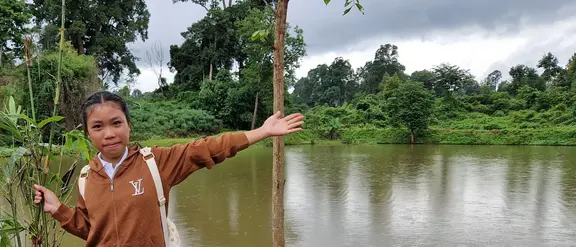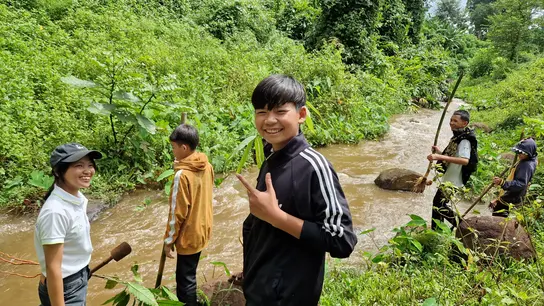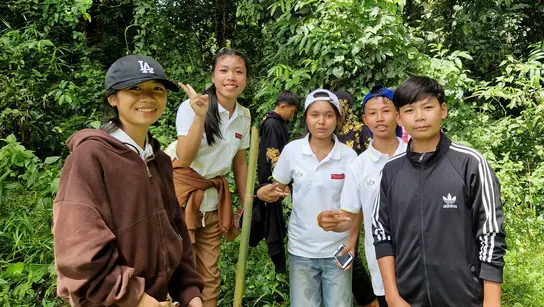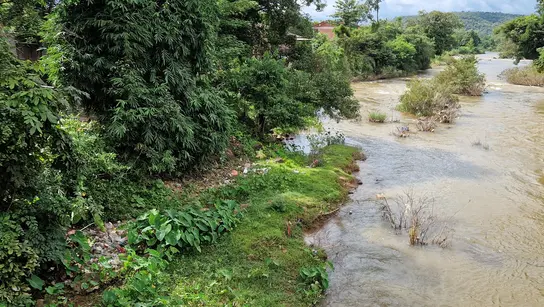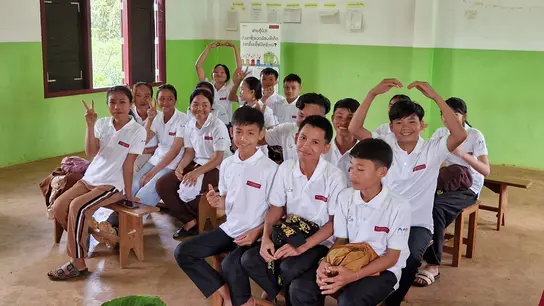Laos: When children protect nature to protect themselves
Salavan Province, southern Laos: Seventeen students from the village of Horkong have come up with something special for their lesson today: They are planting bamboo seedlings by the river. Xan, 15, convinced the village council to procure and bring the seedlings. But the actual planting and manual labor is the responsibility of the children and teenagers.
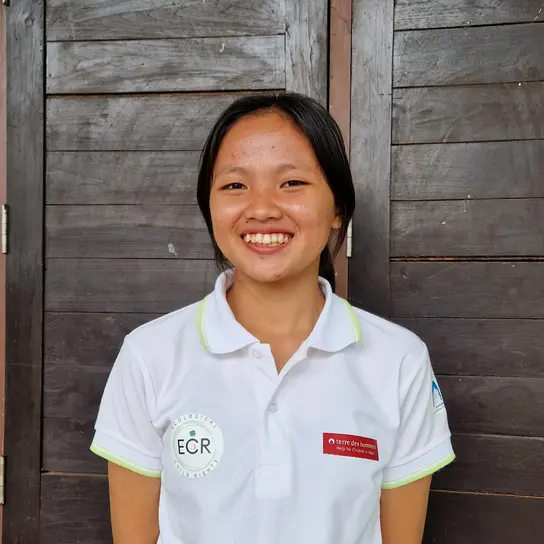
"Of course, we prefer to go outside, for example to plant trees. The bamboo here by the river stores a lot of water in its roots, which then stabilizes the soil during the dry season and helps the surrounding trees."
Xan is the spokesperson for the environmental group at the school in Horkong. She has been involved for two years. Now – and as one of the "older" members of the team – she also passes on her knowledge to the younger ones.
"Before I joined the youth group, I didn't even know what my rights were. Now I know what my rights mean, especially the right to health and the right to a clean environment. I've learned a lot about the environment that helps me now."
In action against plastic waste and pollutants
Salavan's environmental problems are diverse, concrete – and particularly dangerous for younger children. The biggest challenges? Xan doesn't have to think long: "Number one: plastic and waste. Number two: weed killers and other chemicals. Both remain in the environment for a very long time. And both pollute the water."
The chemicals originate from agriculture, the most important source of food and income for many families. Pesticides and herbicides are used particularly on cassava trees to increase yields – but these are often so harmful to health that they have long been banned. After harvesting, the stalks are usually simply burned, releasing the pollutants into the air, soil, and water. This has consequences, especially for young children: common illnesses include severe skin rashes and chronic coughs.
"There are laws and rules. I now know that some of the substances used in Laos are illegal. I've also explained to the adults that some chemicals are banned for good reason. And some of the cassava plantations are very close to a small lake where people fish. That's when the chemicals become truly dangerous for all of us."
And what about the plastic? Salavan has no waste disposal system. Household waste is generally simply burned at the roadside. The remaining materials are washed away by the rain and also end up in groundwater, rivers, and lakes.
“About once a week we therefore organize a litter collection event – we clear away what’s lying around paths and houses,” reports Xan. But the best thing is if the litter doesn’t end up there in the first place: “Reduce, Reuse, Recycle. That’s the most important thing for us.”
Schools as a central hub for nature conservation and responsibility
The fact that Xan's environmental youth group was able to exist is thanks to initial support from Terre des Hommes partner organization, the Association for Community Development (ACD Laos). ACD Laos conducts training for dedicated teachers ("Training of Trainers"). It provides learning materials and practical guidance on environmental and health protection for children. ACD also assists with group meetings and the organization of activities, especially the weekly litter collection.
ACD Laos is also part of the cross-border environmental protection network "ECR Mekong," which is primarily funded by the German Federal Ministry for Economic Cooperation and Development through Terre des Hommes . The goal: to strengthen local environmental and climate protection, protect children's health, and ultimately prevent future generations from having to pay the price for today's deforestation and pollution.
The central focus is on selected schools that are being transformed into so-called "Eco-Schools." Here, it's not just the children who learn: the schools themselves are also supported in developing into model schools for environmental and health protection. There's waste separation to keep harmless paper and organic waste separate from plastic, school gardens where sustainable farming methods are tested, and water dispensers that, at least in this area, ensure a supply of clean drinking water.
Almost as a side effect, the project has achieved something else in Laos. Sone, ACD project manager and contact person for the youth groups, reports: "We're seeing a renewed sense of purpose. The teachers have new perspectives and are familiar with new methods. The quality of learning is improving, so much so that even young people who had actually dropped out of school are now returning. It's not usually the case that students are given so much opportunity to get involved and be creative."
Messages from students in Laos
“Please stop cutting down forests. Try planting new trees instead. I would also like to ask everyone to stop using so much plastic and creating so much plastic waste.”
Xan
“Cassava and rubber are very important to Laos. But if we continue to cut them down and burn them as we have been, it creates a lot of dust and pollutants. It’s important to me that people understand how harmful this is, especially for children.”
Kina
“My parents own a small shop. When we were still handing out plastic bags, customers often just threw them straight onto the street as soon as we left the house. We have to change that.”
Khannitha
"A lot of air pollution here comes from cutting down and burning trees. I wish people would stop burning."
- Pheo
"I would like to ask everyone not to throw their trash everywhere. Especially into the water. Water is our life and we must stop polluting it."
Phoudthasone
"I wish that people would stop destroying the forests. If there are no more forests, nothing will ever be the same again."
Saylom
14.11.2025
